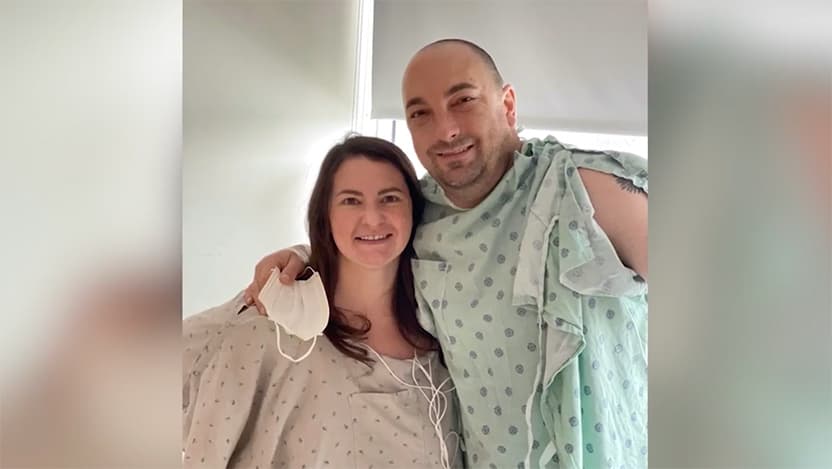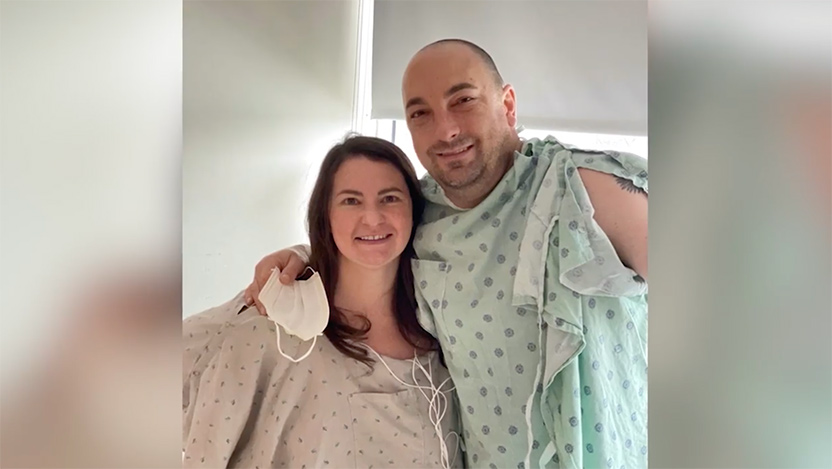To save her brother's life, a Kansas woman donates her kidney through a nearly-scarless surgery

In 2017, Robert Baldwin Jr., was diagnosed with membranous glomerulonephritis (MGN), a progressive disease of the kidneys which can cause them to stop functioning properly.
Baldwin was able to treat the condition for a few years with the help of his local nephrologist — or kidney disease specialist — in Springfield, Missouri, but the condition worsened. His nephrologist recommended the University of Chicago Medicine for a kidney transplant evaluation, his best chance for survival.
Finding a living kidney donor
The average wait time for a kidney from the national deceased donor waiting list in the U.S. is three to five years. When doctors told Baldwin he may not have that much time, his younger sister, Caroline Bivens, stepped in and offered to donate one of her kidneys.
Bivens, who lives in Topeka, Kansas, began the evaluation process with bloodwork at her local hospital. She then visited Chicago and was evaluated by the expert team of kidney transplant specialists at UChicago Medicine. Bivens was a match and reduced Baldwin's transplant wait time down to about five months.

Innovative kidney donor surgery leaves virtually no scar
In February, Baldwin and Bivens came back to UChicago Medicine's Hyde Park campus for their surgeries. For Bivens, doctors used a new, minimally invasive laparoscopic kidney donor surgery (also known as a single-port donor nephrectomy), which is only offered at a handful of hospitals nationwide. The procedure involves a single small incision in the donor’s belly button through which instruments are placed and the kidney is removed. Most patients wake up with a small bandage over the belly button and the scar hidden inside it.
A donor surgery with a quick recovery
The laparoscopic nephrectomy is as safe as the traditional approach that involves making multiple small incisions and a longer extraction incision to remove the kidney. The benefit, though, is that the new surgery requires less healing time for the organ donor and does not leave them with a visible reminder of their donation.
Both surgeries were a success, and Bivens was able to go home 24 hours after her donation.
Dr. Rolf Barth explains how laparoscopic donor nephrectomy works
[MUSIC PLAYING] About a decade ago, our team refined and developed a technique for really the least invasive approach towards kidney donation. We call it single-port donor nephrectomy, and take advantage of really the first scar that any of us are born with, which is our belly button. We make a small incision, hiding it in the belly button, and put a special instrument through which we insert the camera and the instruments needed to do the operation.
We spend that time for the next period of hour or two separating the kidney from the patient, carefully and meticulously dissecting the blood vessels and the kidney. And at the final step, divide those blood vessels and put the kidney into a special sterilized bag, and stretch out the belly button just large enough to bring the kidney out for the recipient.At the end of the operation, we close up the belly button. Everyone ends up with an innie. And the incision is not much bigger than your original belly button. We put a little piece of gauze and a Band-Aid over the incision.
It's actually not a full Band-Aid. We cut the Band-Aid in half. And patients go to recovery and wake up and can look down at their tummy and see half a Band-Aid over their belly button, and know that they've not only saved someone's life by donating their kidney, being able to go home with minimal pain and back to full function, and doing these wonderful acts of kidney donation.
[MUSIC PLAYING]

Rolf Barth, MD
Dr. Barth performed the first scarless single-port laparoscopic donor nephrectomies (kidney removal), and has gone on to successfully complete this procedure over 500 times.
See Dr. Barth's physician profile